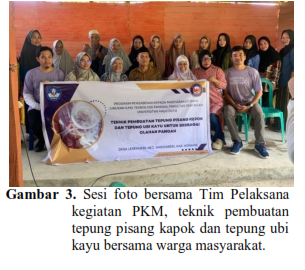Training On Making Kepok Banana Flour And Cassava Flour For Various Food Processes In Lerehoma Village
Keywords:
flour; kepok banana; cassava; food products; community empowerment.Abstract
Abstract
The community of Lerehoma Village, Anggaberi District, Konawe Regency, is predominantly engaged in farming, with bananas and cassava as the main commodities. These crops have high economic value and play an important role in food security. One of the banana varieties widely cultivated is pisang kepok. However, the conversion of pisang kepok and cassava into flour remains rare, despite their potential to be processed into various value-added food products. Limited knowledge and skills in flour production techniques have hindered product development. Therefore, training on the production of pisang kepok flour and cassava flour was conducted, focusing on easy, healthy, and safe methods while maintaining quality, nutrition, and taste, and extending shelf life. This activity is expected to enhance community knowledge and skills, enabling them to process agricultural products into high-value commodities and contribute to increasing household income. The flour-making process is carried out mechanically through milling and oven drying. Optimal drying produces high-quality flour that is easy to apply to various food products and has a relatively long shelf life. Pisang kepok flour and cassava flour hold great potential as raw materials in the food industry, such as for cakes, bread, and other processed products. This innovation serves as a strategic step to increase the added value of local commodities and boost the economy of Lerehoma Village.

